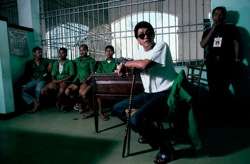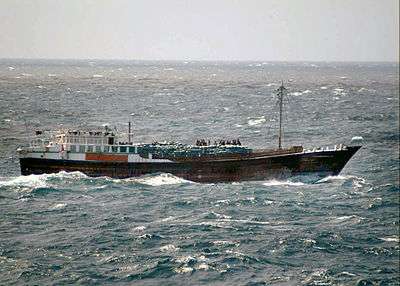Emilio Changco
| Emilio Changco | |
|---|---|
|
Emilio Changco in 1992 at the New Bilibid Prison | |
| Died |
1992 New Bilibid Prison |
| Criminal charge | Piracy |
Emilio Changco was a pirate gang leader based out of Manila Bay in the Philippines. He was responsible for many of the ships that went missing in the area. He specialized in piracy-for-order, where a client would choose a ship and the Changco Gang would seize it, transfer the cargo, and then sell the ship. He was captured and imprisoned by Philippine authorities. In 1992 he was killed by law-enforcement agents under suspicious circumstances. Philippine government officials claim that he was shot while trying to escape from the New Bilibid Prison.
Modern piracy
While piracy in the western hemisphere has been largely eliminated it is still a problem in South East Asia. The International Maritime Bureau (IMB) reports worldwide pirate attacks fell for the third year in a row in 2006. Attacks on ships at sea in 2006 fell to 239 vessels, down from 276 in 2005. That same trend echoed in the Strait of Malacca where attacks dropped from 79 in 2005 to 50 in 2006. Nonetheless, in 2004, the region accounted for 40% of piracy worldwide. The IMB reported in October 2007 that Indonesia continued to be the world's most pirate-struck region with 37 attacks since January 2007, though an improvement from the same nine-month period of 2006.[1] While there has been a drop in South East Asia there has been a rise of acts of piracy with groups based out of Somalia attacking many ships.
Changco Gang
In the 1980s and 1990s while operating out of Manila Bay, Changco and his men used the area's thousands of islands and many small ports to their advantage.[2] They specialized in targeted piracy where a client would pay $US 300,000 and then tell the gang which ship was to be targeted. The ship would be raided by the gang and then the ship, its crew confined, would be sailed to an out of the way port all the while transmitting to its owners that it was stricken by mechanical difficulties and confined to port. In at least one instance, members of Changco's gang would stowaway on the ship before it set sail and then assist other pirates in boarding once the ship set sail.[3] After the seizure, either in port or at sea, the cargo would be transferred to another ship and then the crew would be unloaded and told not to report the incident for a few days. This allowed the Changco gang to paint over the ship making it a "phantom-ship" that could be used for other tasks such as smuggling goods or human smuggling.[4]
Changco was well known throughout the region and companies would often hire him to steal back their cargoes.[2] Companies would also hire him for insurance fraud. The insurance fraud was when the company would have a ship near the end of its service life, the ship would be over-insured and then Changco would be hired to make it disappear so the shipping company could claim the insurance money.[2]
Arrest, Imprisonment and Death
Changco became so brazen that he stole the tanker the M/T Tabangao, a Philippine government owned vessel. The authorities could not tolerate this flaunting of his power and took Changco and his gang down. He was quickly arrested and imprisoned in the early 90s at the New Bilibid Prison in Manila.[5][6] In prison in 1992 he was shot and killed while trying to escape from jail. The circumstances surrounding his death are suspicious as at the time of his death he could barely walk and needed a cane to get around. In his book, The Brutal Seas: Organised Crime at Work, author Douglas Stewart discusses how Changco's death was more likely an effort to silence him than a legitimate escape attempt.[6]
References
- ↑ AP 2007
- 1 2 3 Stewart 2006, p. 29
- ↑ Farley 1993, p. 19
- ↑ Stewart 2006, p. 30
- ↑ Cottrill 1997, p. 80
- 1 2 Stewart 2006, p. 31
- AP (2007-10-16). "Pirate attacks up 14 percent worldwide". MSNBC. Retrieved April 1, 2011.
- Cottrill, Ken (1997). "Modern Marauders". Popular Mechanics. Retrieved April 1, 2011.
- Farley, Mark C. (1993). "International and regional trends in maritime piracy 1989-1993" (PDF). United States Navy. Retrieved April 1, 2011.
- Stewart, Douglas (2006). The Brutal Seas: Organised Crime at Work (2006 ed.). AuthorHouse. ISBN 978-1-4259-8710-7. - Total pages: 372

